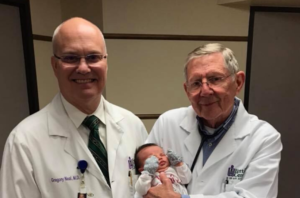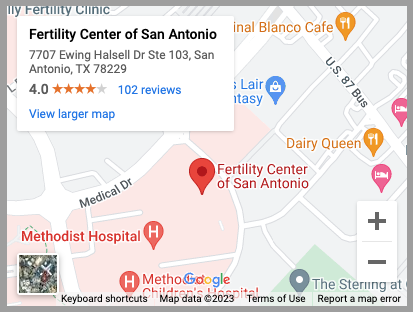Discover your path to parenthood today.
Infertility FAQ
At Fertility Center of San Antonio in San Antonio, TX, we understand that many of our patients will have questions about infertility, the treatments we provide, and what they can expect when visiting our clinic. We have provided answers to frequently asked questions to address any concerns you may have before arriving. If you do not find the answers you are looking for on our infertility FAQ page, our team of specialists would be happy to assist you further during your individualized consultation.
What is Infertility?
Infertility describes a couple’s inability to conceive after six months to a year of well-timed, unprotected intercourse. This condition can also include women who have had repeated miscarriages who are under the age of 35.
Is Infertility a Woman’s Problem?
No. Infertility can affect both men and women. Studies show that 30 percent of cases include male factor infertility and 30 percent include female factor infertility. In the remaining cases, infertility may be caused by both partners or is simply unexplainable.
Is Infertility a Common Problem?
According to the Centers for Disease Control and Prevention (CDC), over 12 percent of women in the United States between the ages of 15-44 have difficulty conceiving or staying pregnant.
Infertility is a condition that describes a couple’s inability to conceive after six months to a year of well-timed, unprotected intercourse.
What Causes Infertility in Women?
The majority of cases involving female infertility are related to ovulation problems as a result of cysts, blocked fallopian tubes, or abnormal ovaries. When a woman ovulates properly, an egg is released from the ovary and travels through the fallopian tube toward the uterus, where it connects with the sperm and implants within the uterine wall. If there is something interfering in this process, patients may be unable to conceive.
Common causes of female factor infertility include:
- Polycystic ovarian syndrome (PCOS)
- Premature ovarian insufficiency (POI)
- Pelvic inflammatory disease (PID)
- Complications from an ectopic pregnancy
- Uterine fibroids (non-cancerous tumors)
- Hormone imbalance
- Diminished ovarian reserve (low egg count)
At Fertility Center of San Antonio, we can perform a variety of tests to determine the cause of infertility and treat the condition accordingly.
What Increases a Woman’s Risk for Infertility?
Common risk factors for female infertility include:
- Age
- Smoking or tobacco use
- Weight (extreme gain or loss)
- Alcohol
- Excessive athletic training
- Physical or emotional stress
- Poor nutrition
- Sexually transmitted diseases
- Health conditions that cause hormone imbalance
- Certain medications
We can review these variables during your comprehensive evaluation.
What Causes Infertility in Men?
Male factor infertility is often related to issues with sperm, which may be present from birth or occur as a result of illness or injury. Issues include:
- Poor sperm mobility
- Low sperm count
- Varicocele (enlarged veins on the testicles)
- Abnormal sperm shape
- Difficulty ejaculating
When Should I See a Doctor?
We recommend meeting with a fertility specialist if you are under 35 years of age and have consistently tried to conceive for over a year. For women over the age of 35, we recommend seeing a specialist after six months of well-timed intercourse.
How Do You Treat Infertility?
There are a variety of treatments available for treating infertility. Our doctors will first perform is a thorough physical examination, taking into consideration your past and current medical conditions. The initial steps may include hormone testing, semen analysis, ovarian reserve evaluation, and a hysteroscopy to determine if there are any blockages, imbalances, or issues with egg and sperm count.
We provide a host of treatments to help patients conceive, including:
- In vitro fertilization (IVF)
- Intrauterine Insemination (IUI)
- Intracytoplasmic sperm injection (ICSI)
- Laser-assisted hatching
We can customize your treatment plan to meet your specific needs and goals.
Schedule Your Appointment
If you have had trouble conceiving or maintaining a healthy pregnancy, our trusted and highly trained fertility specialists can help to determine the source of your condition. Contact our office online today or by calling (210) 692-0577 to schedule your initial consultation.











